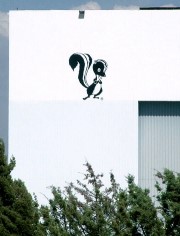|
Home
|
Dec 30, 2024
This week’s themeWords coined in comic strips and cartoons This week’s words skunkworks sad sack embiggen Lower Slobbovia cromulent 
Lockheed Martin’s Skunk Works hangar
Palmdale, California Photo: Bernardo Malfitano / Wikimedia Previous week’s theme No el A.Word.A.Day
with Anu GargI grew up devouring comic books like they were candy, savoring every colorful panel and clever punchline. It was a melting pot of adventures, from India’s Chacha Choudhary (whose brain was said to work faster than a computer) to the swashbuckling exploits of Phantom, the mystifying illusions of Mandrake, and the ever-thoughtful musings of Buz Sawyer. Of all these characters, Buz Sawyer was my favorite -- his sharp wit and reflective nature always kept me coming back for more. It’s no surprise that comic strips, with their knack for blending humor and relatability, have snuck a few words into the English lexicon. This week, we’ll look at five such words. Also see, a previous week of words coined in single-panel cartoons. skunkworks
PRONUNCIATION:
MEANING:
noun: A small, loosely structured corporate research and development unit or subsidiary formed to foster innovation.
ETYMOLOGY:
From Skonk Works, a fictional facility in Al Capp’s comic strip Li’l
Abner that processed dead skunks, old shoes, kerosene, and other odd
ingredients. Earliest documented use: 1960.
NOTES:
The term gained real-world application in 1960 when Lockheed
used it to describe a secretive unit tasked with developing advanced
fighter planes. The facility, located near a plastic factory with an acrid
odor, inspired an engineer to nickname it Skonk Works, later adapted to
Skunkworks. The term now symbolizes agile, creative problem-solving in
corporate or engineering environments.
USAGE:
“The company’s skunkworks, for example, are decentralised to encourage
innovation, but its accountants are centralised. ‘We don’t want highly
innovative accountants,’ says Motorola’s Mr Canavan.” Partners in Wealth; The Economist (London, UK); Jan 21, 2006. A THOUGHT FOR TODAY:
The past is a foreign country; they do things differently there. -L.P.
Hartley, writer (30 Dec 1895-1972)
|
|
Subscriber Services
Awards | Stats | Links | Privacy Policy
Contribute | Advertise
Awards | Stats | Links | Privacy Policy
Contribute | Advertise
© 1994-2025 Wordsmith